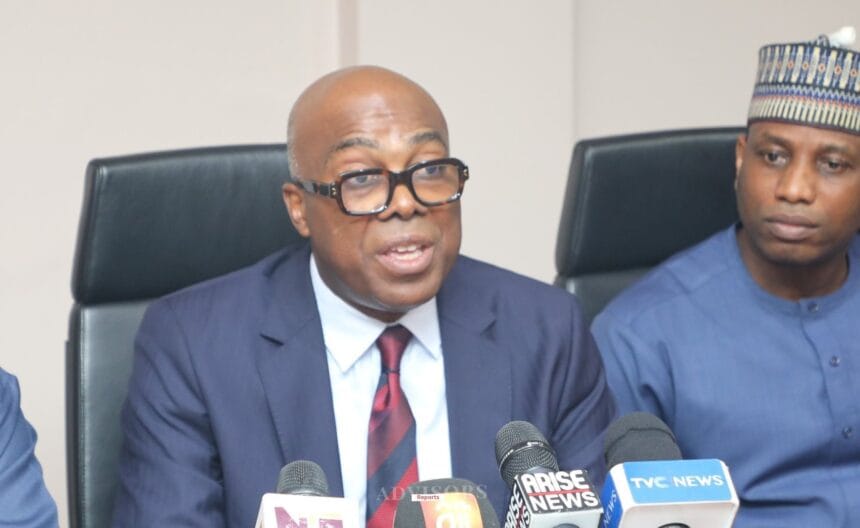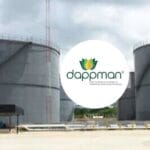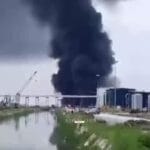… claims as of June 2024, average sulfur content in all imported Diesel is below 50/ppm limits
… says deregulation of downstream sector allows petroleum marketers to source products freely
“We deferred declaration, to allow local refineries continue to produce at a higher sulphur level till Dec. 31 2024″ – Ukoha
Emmanuel Oduara, Abuja
The Nigerian Midstream and Downstream Petroleum Regulatory Authority (NMDPRA) has refuted allegations by Dangote Refinery that it permitted the importation of high-sulfur diesel and aviation fuel from Russia, labeling these claims as false.
The Authority therefore asserted that as of June 2024, the average sulfur content in all imported Automotive Gas Oil (AGO) in Nigeria is significantly below the 50 parts per million (PPM) limits specified in Section 317 of the Petroleum Industry Act (2021).
It also emphasized that the downstream sector in Nigeria based on the provision of the PIA, operates as a deregulated market, which provides petroleum product marketers the autonomy to decide whether or not to engage with local refiners.
Ogbugo Ukoha, NMDPRA, Executive Director, Distribution Systems, Storage, and Retailing Infrastructure, made this known at the end of a meeting with Domestic Refining companies and Major Marketers of Petroleum Products in Abuja on Tuesday.
Advisors Reports gathered that the discussion at the meeting focused on the sufficiency of product supply and off-take from domestic refineries.
Ukoha revealed that petroleum product marketers have the ultimate liberty to make commercial decisions on where to source their products, based on the deregulation, whether locally refined or imported from outside the country.
While the government would continue to encourage patronage of the local refiners, he revealed that the Authority’s role is to ensure that quality products are sold to consumers and at a fair price.
Ukoha said, “What we have in Nigeria is a deregulated market that remains open. The Petroleum Industry Act makes several provisions, and the Authority will continue to work towards operationalising all those. That is the guarantee that we give, that in the fullness of time, all the aspects of the PIA will be operationalised.
“Currently, the refiners locally are producing substantial volumes of AGOs (automotive gas oil) and ATK (aviation turbine kerosene), and we have assurances that shortly PMS (premium motor spirit) will also kick in. There are also intermediate products that are produced. The modular refineries have historically been doing LPFO and Nafta, those are intermediate products. But the country is working towards when its self-sufficiency will be achieved”.
He explained that the Authority has not issued a license to any marketer to import dirty products into the country, adding that the Sulphur content of diesel imported into the country was below the average set by regulators.
The Director said, “Many people do not know that the ECOWAS Heads of States in 2020 endorsed a declaration adopting the Afri-five fuel roadmap that requires that certain products have a minimum of 50 parts per million liters (ppm) of sulfur.
“Whilst it encouraged almost immediate enforcement against imports to comply with that standard, the same treaty deferred enforcement for local refineries up to 31st December 2024.
“Section 317 of the PIA, when it was passed in 2021 also captured that declaration. As a regulator has engendered compliance with the minimum sulfur content and ensured the downward trend up to 2022 – 2023 December. In January of this year, we noticed a spike in the Sulphur content of products being imported. And we again now began strong enforcement from the first of February.
“As of June, this year, the average Sulphur content in every diesel imported into the country is far below what the 50 PPM provision is in the law.
” With the local refineries, remember that that declaration deferred it, and so they continue to produce at a higher level, but we’re not very anxious about that.
“The new refineries that are being established, have within the design of their facilities the desulfurization units that will see significant drop in Sulphur content down to as low as 10 ppm.
“And so, I would like to assure Nigerians that this is a mandate that the Authority takes very seriously and that we are here to guarantee the well-being and health of Nigerians, and there is no dirty fuel that we will encourage to come into Nigeria”.
Dr. Gabriel Ogbechie, the Group Managing Director of Rainoil Limited, in his comment on the development, noted that petroleum product marketers in Nigeria have also been lifting products from the Dangote Refinery.
The GMD of RainOil also commended the NMDPRA leadership for organizing the meeting and emphasized the commitment to maintaining a level playing field between marketers and refiners, and to ongoing collaboration for the industry’s benefit.
He assured that major oil marketers have been and will continue to support local refineries, while also having the option to source products from elsewhere. He noted that these practices remain unchanged, though discussions are still ongoing.




